FOI 04/2018 – SCHEDULE OF DOCUMENTS
Date
Description
Pages
Decision
Letter from Chairman, Tourism
1
3.01.2006
Australia (
TA) to President,
1
Release
Remuneration Tribunal (
Tribunal)
Letter from President, Tribunal to
2
21.06.2006
4
Release
Chairman, TA and attachment
Letter from President, Tribunal to
3
21.06.2006
Managing Director, TA and
6
Release
attachment
Letter from Chairman, TA to
4
11.07.2006
1
Release
President, Tribunal
Emails between Tribunal
Secretariat and Secretary,
5
1.08.2006
10
Exempt
Department of Industry, Tourism
and Resources with attachment
Emails between Tribunal
Exempt
6
1.08.2006
3
Secretariat and President, Tribunal
7
1.08.2006
Tribunal meeting brief
3
Exempt
Draft letter from President, Tribunal
Exempt
8
Undated
2
to Chairman, TA
Draft letter from President, Tribunal
Exempt
9
Undated
2
to Chairman, TA
Letter from President, Tribunal to
Exempt
10
08.08.2006
10
Chairman, TA with attachment
Record of meeting between Minister
Partially exempt
11
08.08.2006
for Small Business and Tourism
1
and Tribunal
Letter Chairman, TA to President,
Exempt
12
23.08.2006
4
Tribunal with attachment
PO Box 281 Civic Square ACT 2608 • Phone 02 6202 3930 • Fax 02 6204 2736
http://www.remtribunal.gov.au
31522973

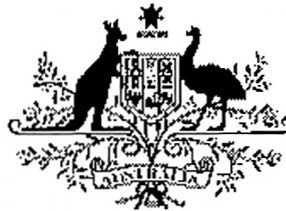
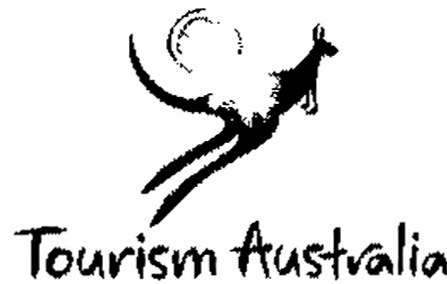
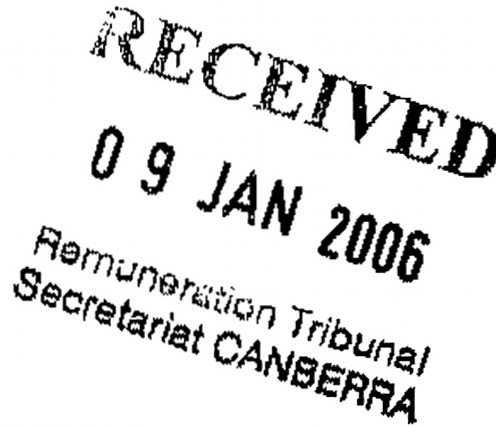

Document 1
Australian Government
3 January 2006
Mr John Conde
President
Remuneration Tribunal
-----· ·PO-BOX 28'1- ··---
Civic Square ACT 2608
Dear John,
This is to formally aeknowledge your letter of 11311 of Deeember,
eonveying information arising from the review of the Principle
Executive Office (PEO) strueture. I have carefully noted the Tribunal's
decisions and will convey them to the relevant elements of Tourism
Australia forthwith.
Yours sincerely,
Chairman, Tourism Australia
Darling Park Tower 2 Level 18 201 Sussex Street NSW Australia 2000
GPO Box 2721 Sydney NSW 1006
Telephone +612 9360 1111 Facsimile +612 93316469
tou r1s m.aus tr al ia.corn
AUCKLAND BANGKOI< CANBERRA FRANKFURT HONG KONG KUALA LUMPUR LONDON LOS ANGELES SEOUL SHANGHAI SINGAPORE SYDNEY TAIPEI TOKYO
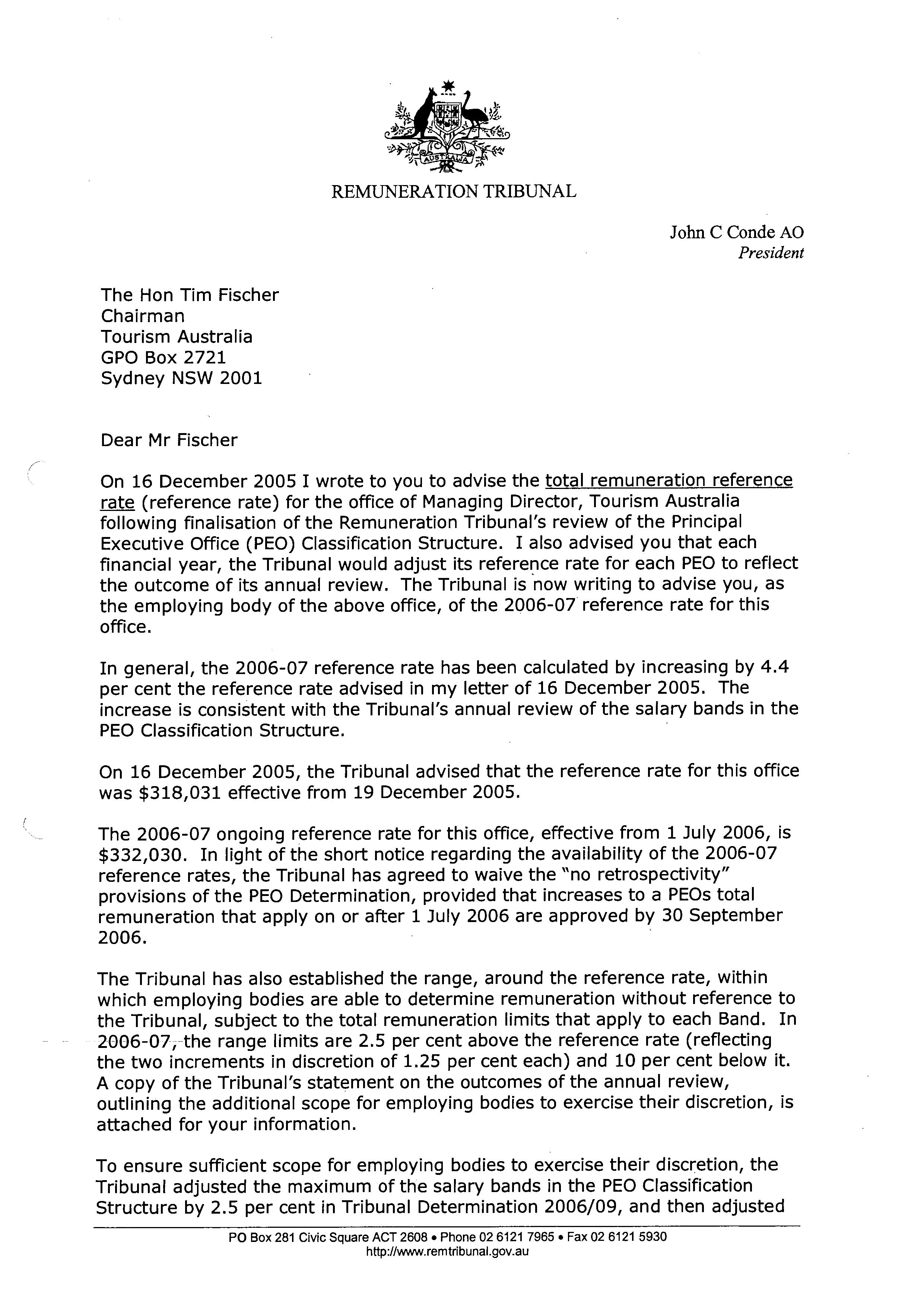
Document 2
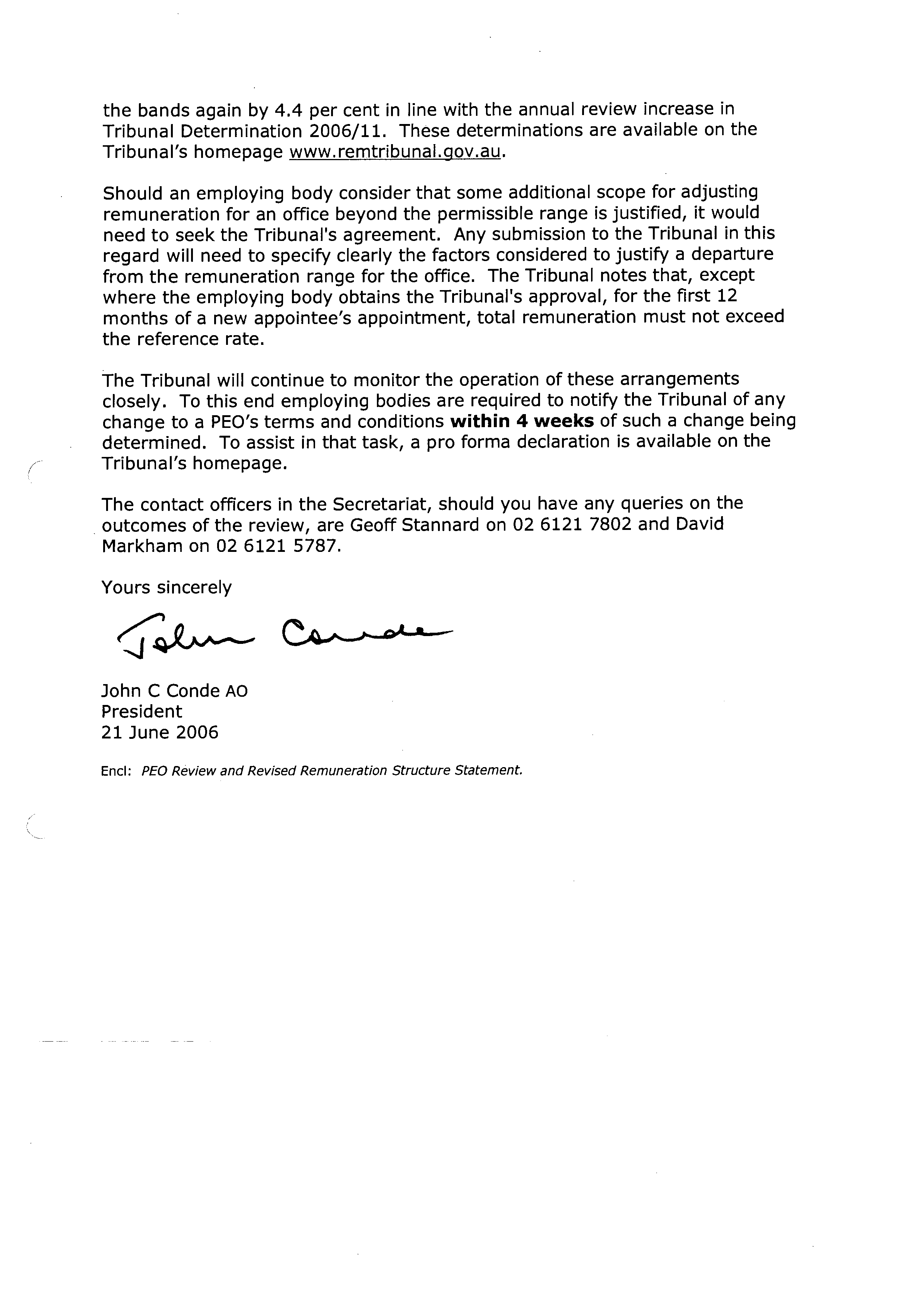
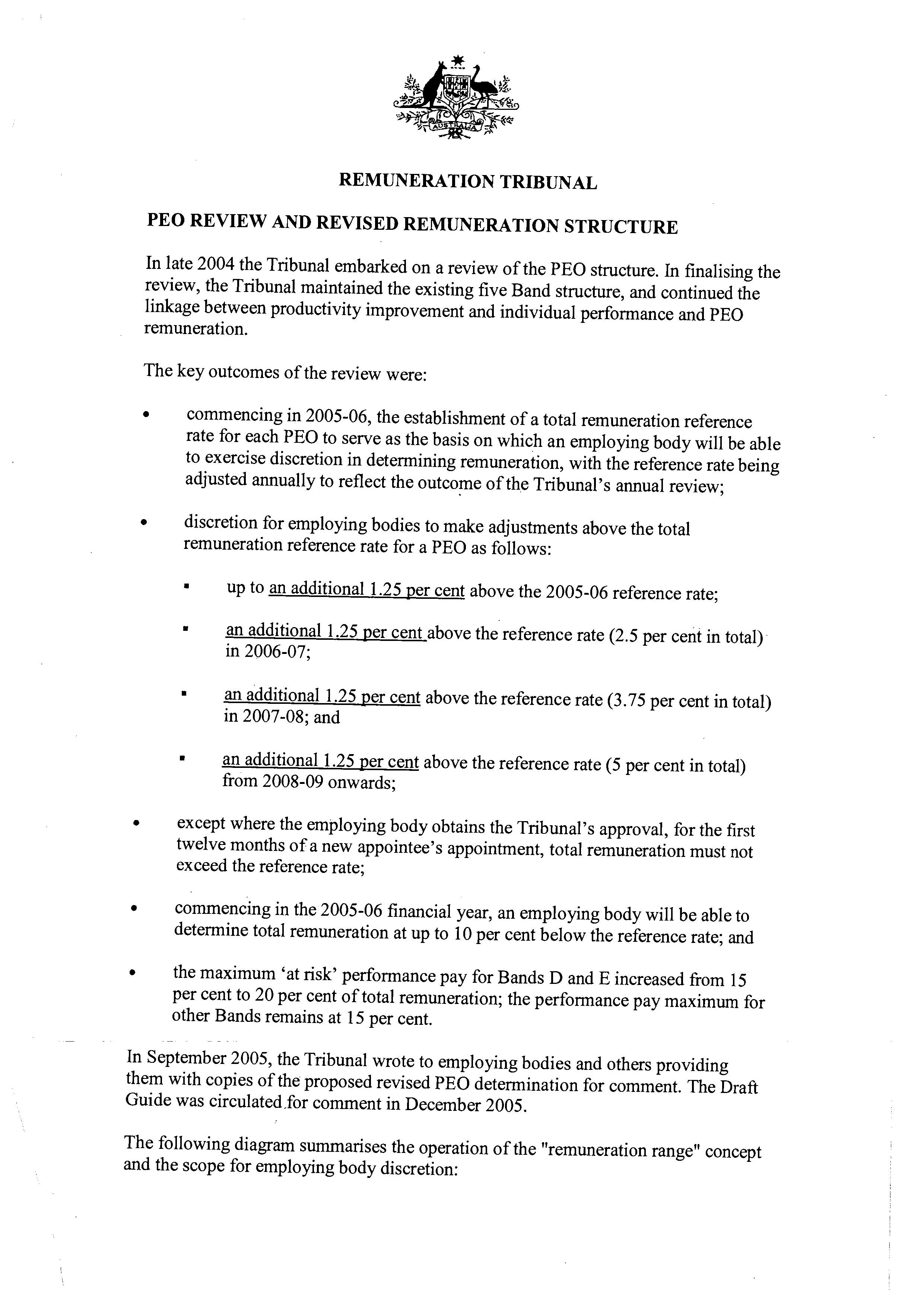
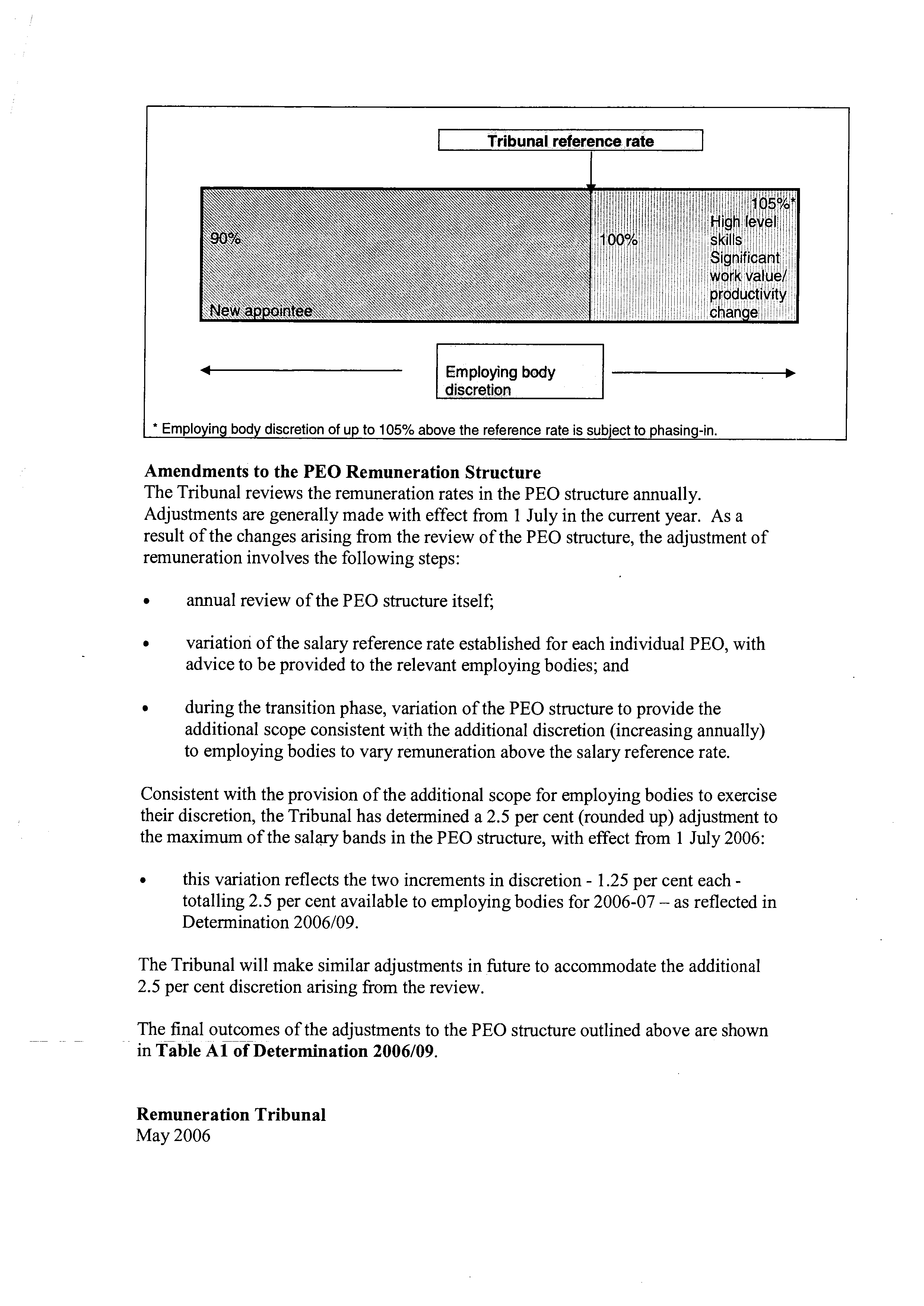
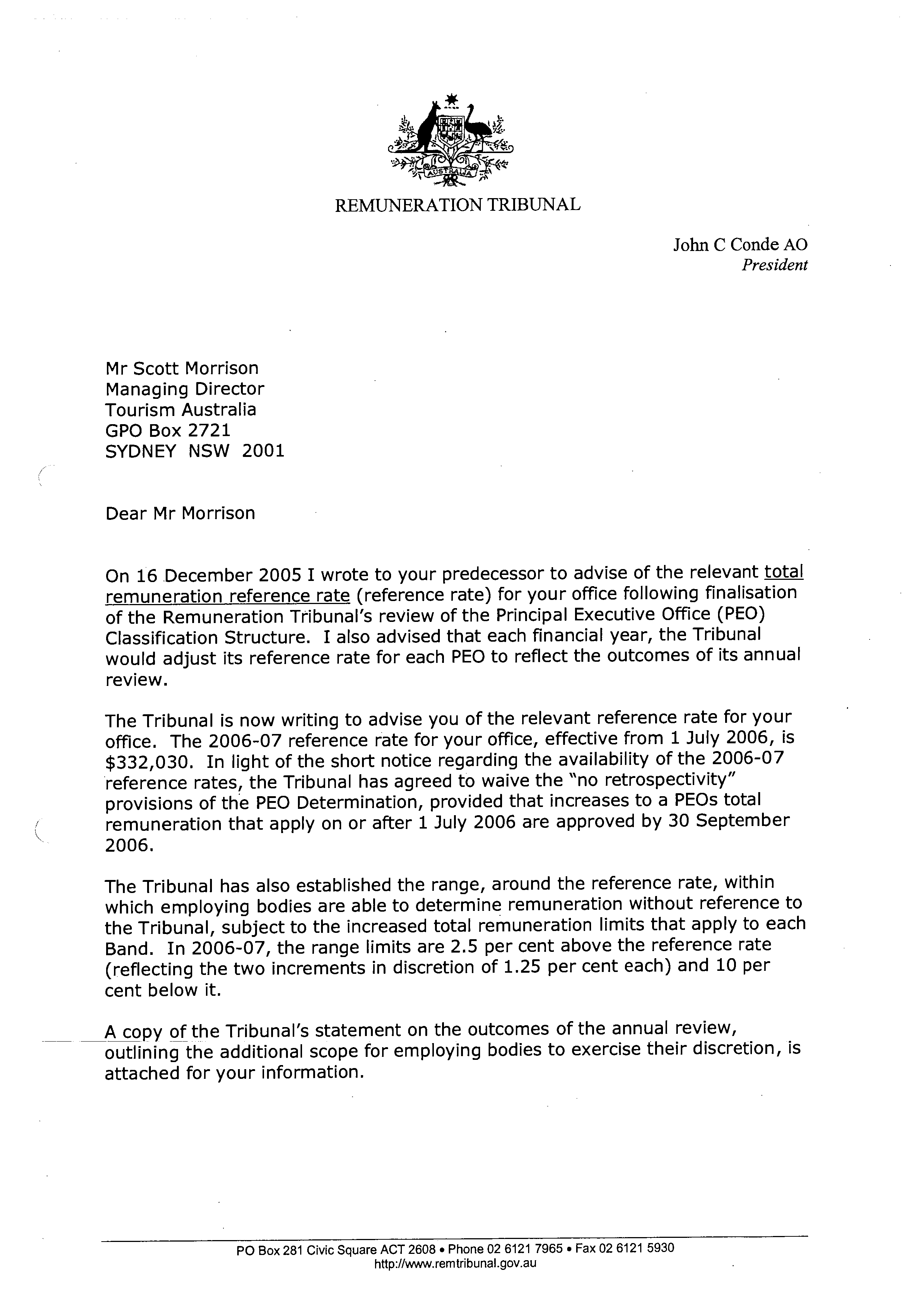
Document 3
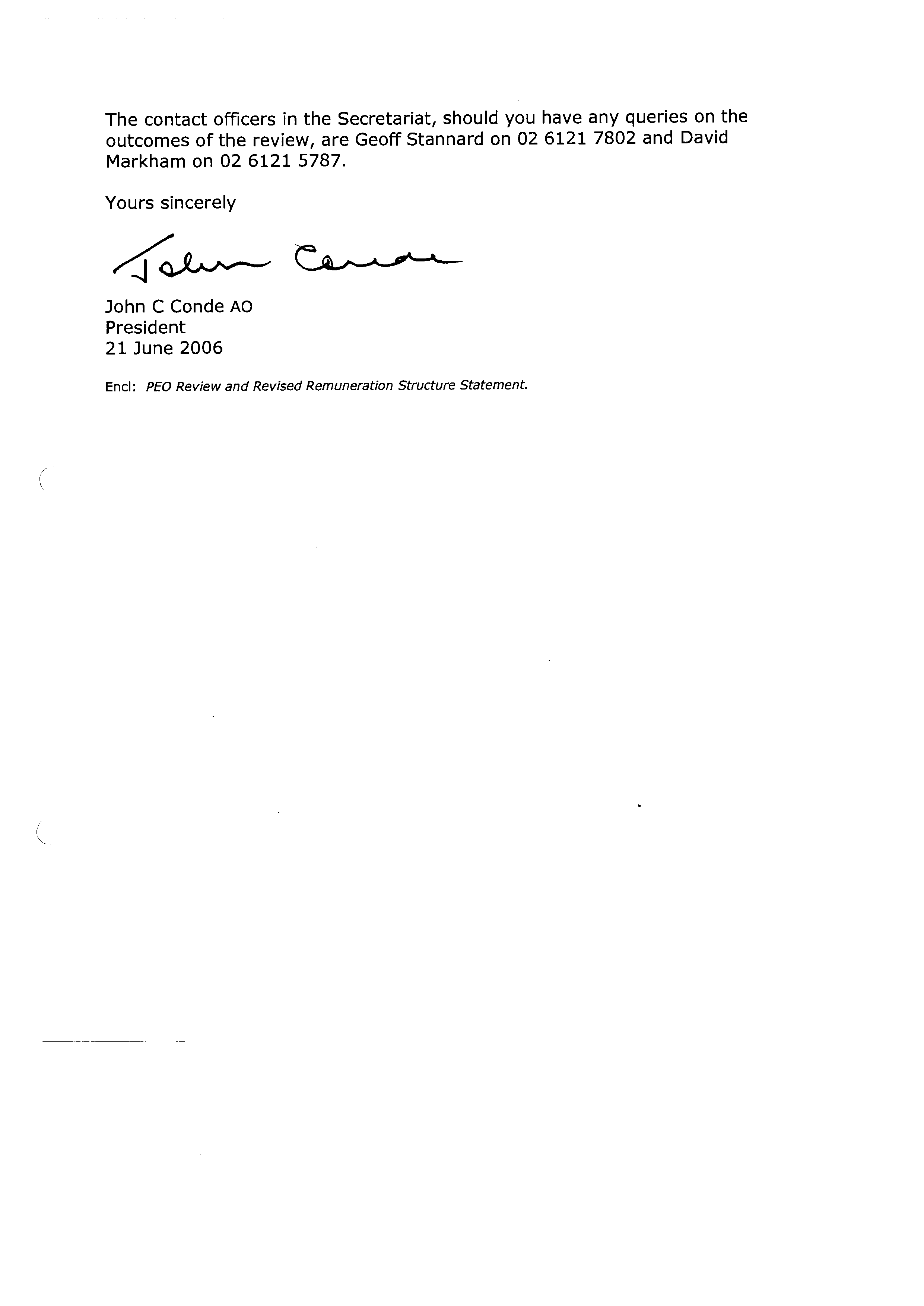
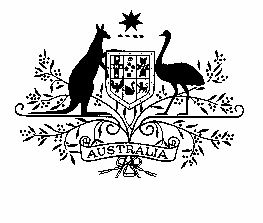
REMUNERATION TRIBUNAL
Statement on 2006 Reviews of Remuneration and
Allowances for Holders of Public Office
The Remuneration Tribunal has inquired into and determined the remuneration and
significantly related conditions for Public Office Holders (excluding judicial and
related offices), as required under sub-sections 7(3) and 7(4) of the
Remuneration
Tribunal Act 1973 (the Act).
The statement summarises the outcome of the Tribunal's annual reviews of full-time
and part-time public offices, Specified Statutory Officers, and the Principal Executive
Office (PEO) structure.
The Tribunal, having had regard to a range of factors, decided that an adjustment of
4.4% is justified. In the case of full-time and part-time public offices, and Specified
Statutory Officers, the adjustment has been effected in two steps.
Background
By Determinations 2006/05, 2006/06, 2006/07 and 2006/08, the Tribunal Adjusted
the base salary, total remuneration and fees, as appropriate, of Specified Statutory
Officers and full-time and part-time offices. For Specified Statutory Officers, having
regard for the date of effect of the previous annual adjustment, the date of effect was
determined as 2 May 2006. For full-time and part-time offices, the adjustment was
determined to take effect on and from 1 July 2006.
Determinations 2006/11, 2006/12 and 2006/13 Determination 2006/11 reflects the outcome of the Tribunal's annual review of the
PEO classification structure. Consistent with the reviews of other offices, band
maxima total remuneration and superannuation salaries have been adjusted by 4.4%
with effect from 1 July 2006.
Determination 2006/11 also adjusts the base salary, total remuneration and fees, as
appropriate, of Specified Statutory Officers by 0.4% with effect from 1 July 2006.
This will enable future adjustments for these offices to more closely aligned with the
annual reviews of other public offices.
Determination 2006/12 adjusts the fees payable to holders of part-time public offices
by 0.4% with effect from 1 July 2006.
Determination 2006/13 adjusts the base salary, total remuneration and fees, as
appropriate, of full-time offices by 0.4%, also with effect from 1 July 2006.
Page 1 of 4
Review of Offices in the Senior Economic Regulatory Agencies
Determination 2006/13 also incorporates the outcome of the Tribunal’s review of the
remuneration of the public offices in the senior economic regulatory agencies - the
Australian Prudential Regulation Authority (APRA), the Australian Securities and
Investments Commission (ASIC) and the Australian Competition and Consumer
Commission (ACCC).
The Tribunal's intention, in undertaking the review, has been to ensure that the
remuneration of the offices concerned is appropriate, having regard to their respective
responsibilities. The remuneration of such offices must also be sufficient to ensure
that governments are able to appoint capable people with the skills and experience
necessary to meet the very significant, and continually evolving, responsibilities of
the offices concerned.
APRA, ASIC and the ACCC
The work of these agencies is central to the effective functioning of the Australian
economy.
The ACCC enforces and administers the Trade Practices Act 1974 (TPA) and, as a
result, holds a very public profile as an economic regulator. The ACCC has wide-
ranging responsibilities to seek to promote effective competition and informed
markets, encourage fair trading and protect consumers, and to regulate infrastructure
service markets in other markets where competition is restricted. The Government
has commenced an extensive legislative program to reform various aspects of the
TPA.
ASIC administers corporate law in relation to some 1.4 million companies. A key
challenge for ASIC is the effective regulation of licensed exchanges and listed
companies. The importance of this role is underscored by the fact that more than 55%
of Australian adults directly or indirectly own shares. Confident participation by
retail investors is assisted by financial services laws that maintain quality and value of
financial advice for some 2.1 million people with a financial adviser. ASIC's
consumer protection functions now encompass 15.7 million people with a deposit
account and 10.5 million people investing through superannuation or annuities.
APRA plays an important, high-profile and specialised role in the financial sector. It
is the prudential regulator of banks, insurance companies and superannuation funds,
credit unions, building societies and friendly societies. APRA currently supervises
institutions holding approximately $2.2 trillion in assets for 20 million Australian
depositors, policyholders and superannuation fund members.
Following the collapse of the insurance company HIH in March 2001, and the report
of the HIH Royal Commission, APRA's structure and powers were reformed
extensively. In particular, the previous nine-member part-time board was replaced by
a full-time executive body.
The Tribunal reviewed the remuneration of the APRA offices - the Chairman, Deputy
Chairman and Member - at that time and determined remuneration at levels consistent
with the importance of APRA's responsibilities. The remuneration arrangements then
Page 2 of 4
established have continued, varied only by annual adjustments determined by the
Tribunal.
The remuneration of the ASIC offices - the Chairman, Deputy Chairman and Member
- has not been reviewed substantively since ASIC's establishment, in 1998, as the
successor to the Australian Securities Commission. It is apparent to the Tribunal that
there have been significant changes in both the agency and its functions since that
time. Consistent with the increase in its responsibilities, the resources made available
to ASIC to perform its functions have increased significantly.
The remuneration of the ACCC offices - Chairman, Deputy Chairman and
Commissioner - has not been reviewed substantively for some time. Legislative
change has broadened the ACCC’s responsibilities and its budget and number of staff
have increased commensurately.
The Tribunal's Approach
The Tribunal considers that, in general, offices of comparable responsibility should be
remunerated at like levels. Changes in remuneration should have primary regard for
changes in responsibility or, more generally, work value.
The Tribunal does not consider that the remuneration for public offices should be
driven solely by market considerations. The Tribunal considers that the honour of
appointment to a high public office entails acceptance, on the part of appointees, of
less remuneration than the appointee would receive in the private sector. Nonetheless,
it would be to the detriment of the federal public sector were it to lose touch with
broader developments in remuneration.
The Tribunal's Conclusions
The Tribunal considers that developments in the roles and responsibilities of ASIC
and ACCC justify the remuneration of the public offices in those agencies being
brought into broader alignment with the remuneration of the public offices in APRA.
In particular, the Tribunal considers that the remuneration of the offices of Chairman
of ASIC and Chairman of the ACCC should continue to be closely aligned, having
regard to the remuneration of the office of Chairman of APRA.
The Chairman is responsible for the effective operation of the agency which he leads.
In the case of each agency, the Deputy Chairman and Member/Commissioner have
less responsibility than the Chairman, although, based on discussions with the
agencies, the relativities are different in each case. In the case of ACCC, the role of
Deputy Chairman is closer in nature to the role of Member/Commissioner, whereas in
the cases of ASIC and APRA the role of Deputy Chairman is more clearly related to
that of the Chairman. The Tribunal considers that these factors should be reflected in
the remuneration determined for these offices.
The Tribunal is satisfied that the remuneration levels in APRA are appropriate and
therefore intends for the time being to maintain these at their existing levels – subject
to the Tribunal’s standard annual review.
Page 3 of 4
In all three agencies, the Tribunal has given careful consideration to the roles and
responsibilities of the offices of Deputy Chairman and Member/Commissioner. In the
Tribunal's view, it is important that each agency should have the capacity to call on an
experienced office-holder, with relatively broad exposure across the range of the
agency's functions, to undertake the role of Chairman in the absence of the
substantive Chairman. However, given differences in the responsibilities of the three
agencies and in the ways in which they are organised and operate, the roles of Deputy
Chairman and Member/Commissioner are not, in the Tribunal's assessment, uniformly
determinable.
These considerations are reflected in the remuneration determined by the Tribunal for
the public offices concerned which will come into effect on 1 July 2006.
The Tribunal will give further consideration to the remuneration of these public
offices as part of its 2007 review.
Remuneration Tribunal
June 2006
Page 4 of 4
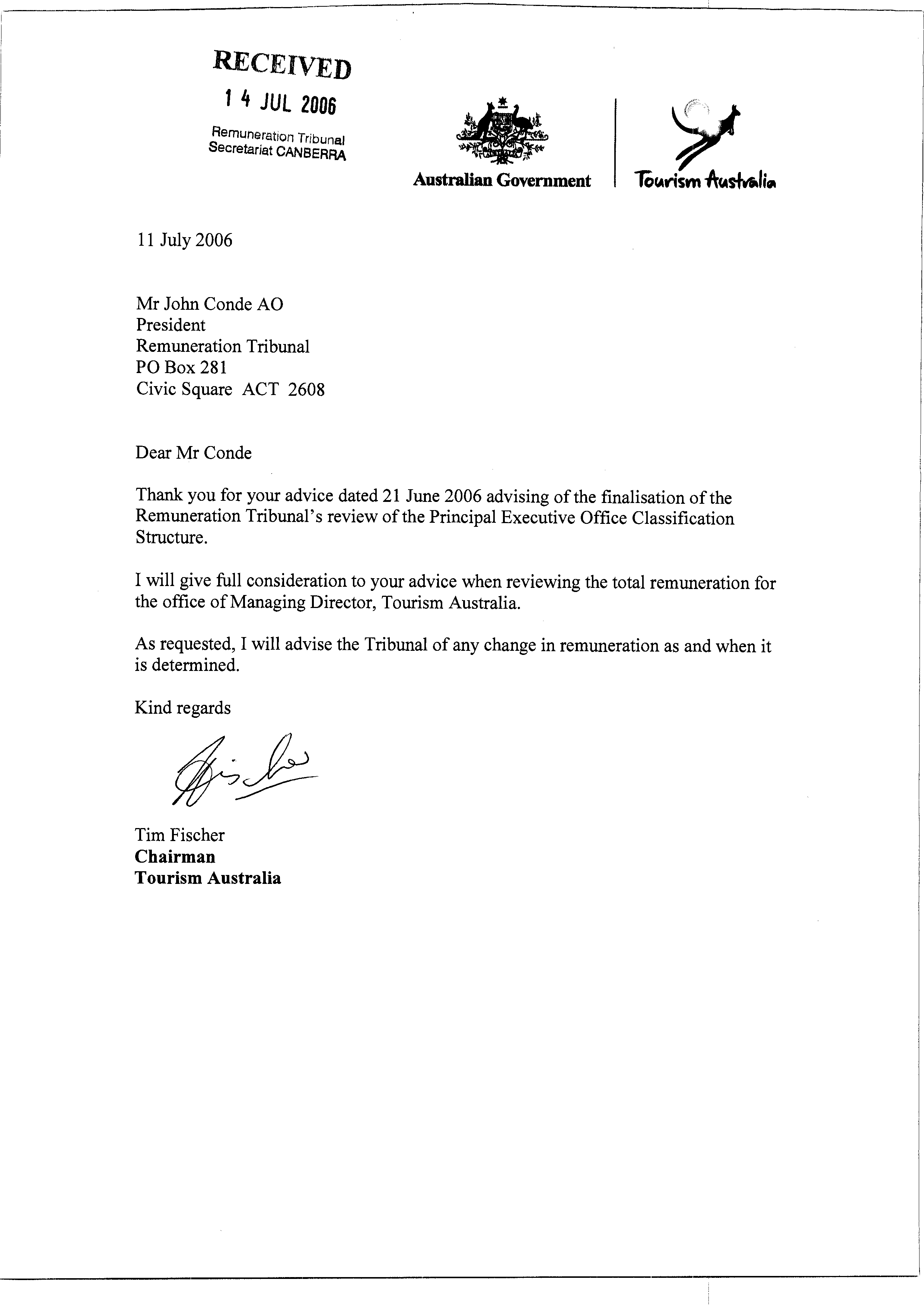
Document 4
Document 11
MEETING WITH THE HON FRAN BAILEY MP
MINISTER FOR SMALL BUSINESS AND TOURISM
Date:
7 August 2006
Time:
5.30pm
Location:
Minister's Office, MF51, Parliament House, Canberra
ATTENDEES:
The Hon Fran Bailey MP, Minister for Small Business and Tourism
Mr Daniel Tehan, Chief of Staff to the Minister for Small Business and Tourism
Remuneration Tribunal
• John Conde AO (President)
• Janet Grieve (Member)
[Note: Mr Allen participated in the Tribunal meeting on 7 August via teleconference and, not being in Canberra, was
therefore unable to attend the meeting with Minister Bailey]
Remuneration Tribunal Secretariat
• Derren Gillespie (Secretary)
BACKGROUND
The meeting was arranged on the Tribunal's initiative to discuss recent developments involving Tourism
Australia.
KEY POINTS OF DISCUSSION
The Tribunal and the Minister canvassed their respective perspectives on matters related to the departure of the
Managing Director of Tourism Australia prior to the expiration of the term of his appointment.
s 45
The Tribunal noted its intention to write to the Chairman of Tourism Australia about the matter and indicated that
it would provide the Minister with a copy of its letter.
Derren Gillespie
Secretary to the Remuneration Tribunal
8 August 2006
H:\Meetings\2006\1. In Session\06 - 15 September\Item 1 - Minutes\Minutes - Minister Bailey - 7
August 2006.doc
Document Outline
- Your freedom of information request – FOI 4/2018
- Decision
- Reasons for DECISION
- Section 45 – documents containing material obtained in confidence
- Other exemptions
- Review Rights
- Internal review
- Review by the Australian Information Commissioner
- Complaints to the Australian Information Commissioner












